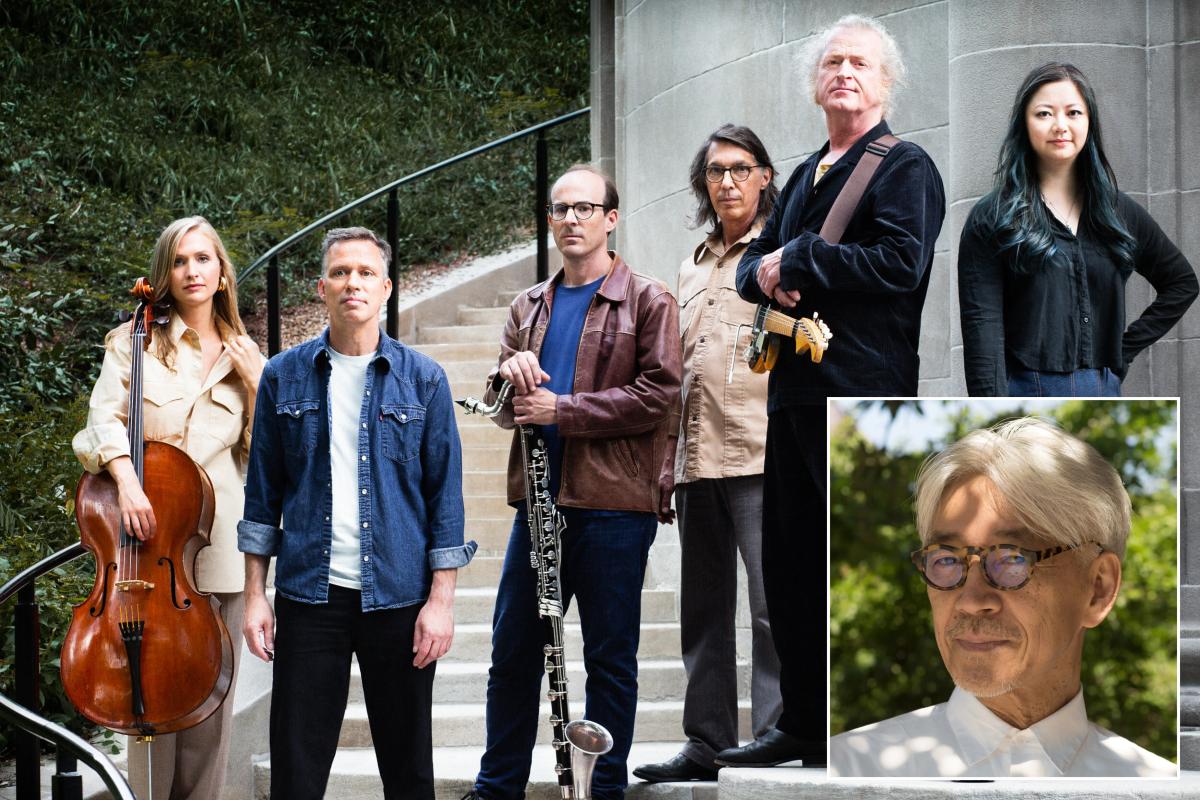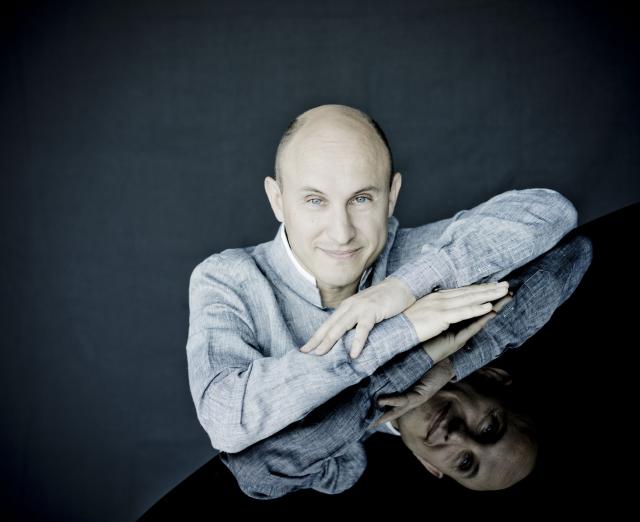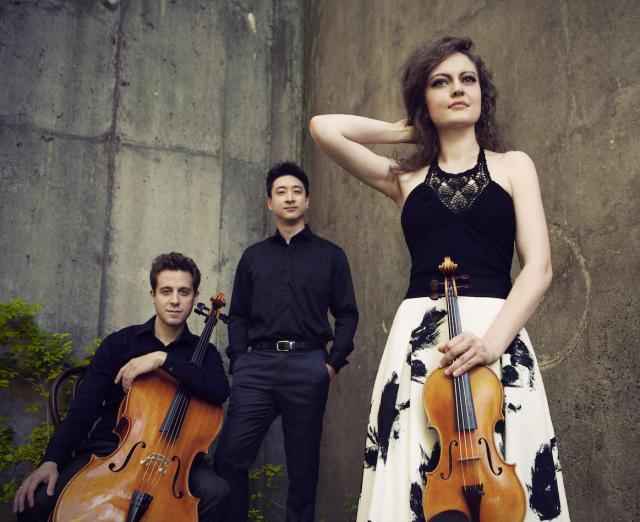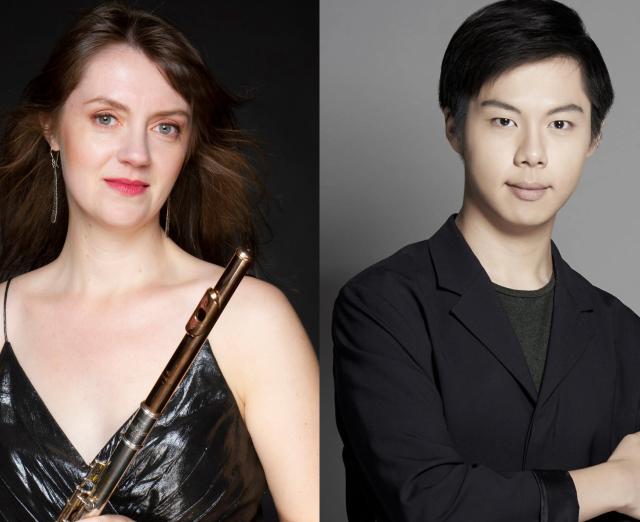Centennial Concert: Bang on a Can All-Stars
Chamber Ensemble

When Ryuichi Sakamoto was a high schooler in Tokyo, he had to ride a commuter train to get to class. The passengers were always crammed on, trapping one another between stray limbs and contorted torsos. Unable to move, all the teenage Sakamoto could do was listen. He amused himself by counting the sounds the train made, identifying more than 10 that he would listen out for every morning.
Close listening is a habit that has carried Sakamoto through nearly 70 years of musical exploration, each decade leading him in new directions. He was born in 1952, the year John Cage composed 4′33″. When he was a toddler, he was introduced to the piano, an instrument he would go on to examine from many Cageian angles. As the ’70s bled into the ’80s, he segued from an ethnomusicology and composition degree to the role of keyboardist and songwriter for Yellow Magic Orchestra, the proto-synthpop group led by Haruomi Hosono. In the solo career years that followed, Sakamoto’s embrace of a new wave of electronic instruments led to fruitful experiments in fusing global genres, which in turn made way for close studies of classical impressionism. Many times over Sakamoto’s sonic path has leapt forward then looped back on itself, forever telling the present something of both its past and future.
The how of composition is as important to Sakamoto as what he makes, and more often than not his creative process starts with improvisation. “You have to open your ears all the time because anything could happen unexpectedly,” he has said of his approach. “Anything can be music.” A wrong note could be the right way into a fresh musical idea. The sounds of a city at night might inform the architecture of a new album. In fact, it was a building that inspired Glass, Sakamoto’s 2016 live improvised composition with longtime friend Alva Noto. Specifically, Philip Johnson’s modernist Glass House, which the American architect built in Connecticut in the late ’40s to live in. As part of their performance, Sakamoto and Noto played Johnson’s glass and steel home like an instrument, sweeping rubber mallets over its contact mic’d surfaces.
The relationship between space and sound, how the one reflects and refracts the other, is something that Sakamoto has also explored in his collaborations with visual artists. In All Star Video (1984), his digital compositions were augmented by Nam June Paik’s hyperactive video art. In 1999, he premiered his multimedia opera LIFE, for which he made Shiro Takatani his visual director. Expanding on LIFE’s themes of symbiosis and evolution, Sakamoto and Takatani went on to produce several ambient installations together, which combined art objects, audio, and video. In 2018, Sakamoto’s various art project collaborations were brought together for the first time in Seoul, as part of a retrospective exhibition titled LIFE, LIFE.
Outside of his artistic practice, Sakamoto has written music for a wide variety of settings, including the 1992 Olympic Games in Barcelona, a health tonic ad (which grew into “Energy Flow”), and an episode of Black Mirror (2019). However, it is his contributions to cinema for which he is most often recognised. He has scored over 30 films in as many years, including Nagisa Oshima’s Merry Christmas Mr Lawrence, Bernardo Bertolucci’s The Last Emperor and The Sheltering Sky, Alejandro González Iñárritu’s The Revenant, and Yoji Yamada’s Nagasaki: Memories of My Son. His cinematic accolades include an Academy Award, a Grammy, a BAFTA, and two Golden Globe awards. “Working on a film is like a journey to an unknown place,” Sakamoto once said . “I cannot experience that doing my own thing.”
In recent years, the Sakamoto who once counted all the sounds he could hear on his train journey to school has resurfaced with renewed vigor. His 2017 album, async, paints an audio portrait of the passing of time, informed by his recovery from throat cancer. In a documentary released the same year – Ryuichi Sakamoto: Coda, directed by Stephen Nomura Schible – he travels to the Arctic to record the sound of melting snow. In another scene, he plays a “drowned” piano that was found in the Miyagi Prefecture during the aftermath of the 2011 earthquake-tsunami that triggered a nuclear disaster in Fukushima, Japan. “We humans say [the piano] falls out of tune,” Sakamoto says in Coda. “But that’s not exactly accurate. Matter is struggling to return to a natural state.”
These sonic observations are not just aesthetic; they run in parallel to Sakamoto’s environmental and activism work. He is an anti-nuclear campaigner and the founder of the more trees project, which is involved in reforestation and carbon offsetting. The veins that connect Ryuichi Sakamoto’s music, art, and activism are his meditations on the ever-evolving nature of life. “Music, work, and life all have a beginning and an ending,” said Sakamoto in early 2019. “What I want to make now is music freed from the constraints of time.”
Formed in 1992, the Bang on a Can All-Stars are recognized worldwide for their ultra-dynamic live performances and recordings of today’s most innovative music. Freely crossing the boundaries between classical, jazz, rock, world and experimental music, this six-member amplified ensemble has consistently forged a distinct category-defying identity, taking music into uncharted territories. Performing each year throughout the U.S. and internationally, the All-Stars have shattered the definition of what concert music is today.
Together, the All-Stars have worked in unprecedented close collaboration with some of the most important and inspiring musicians of our time, including Steve Reich, Ornette Coleman, Meredith Monk, George Lewis, Louis Andriessen, Terry Riley and dozens more. The group’s celebrated projects include their landmark recordings of Brian Eno’s ambient classic Music for Airports and Terry Riley’s In C, as well as live performances with Philip Glass, Meredith Monk, Don Byron, Iva Bittová, Thurston Moore, Owen Pallett and others. The All-Stars were awarded Musical America’s Ensemble of the Year and have been heralded as “the country’s most important vehicle for contemporary music” by the San Francisco Chronicle.
Current and recent project highlights include their own new arrangements of Ryuichi Sakamoto’s landmark album 1996; Julia Wolfe’s Flower Power for Bang on a Can All-Stars and orchestra, premiered with the L.A. Philharmonic; a new live arrangement of Terry Riley’s iconic and inspirational A Rainbow in Curved Air, celebrating the legendary composer’s 90th Birthday year (2025); a recording of legendary composer/performer Meredith Monk’s MEMORY GAME; Can Dance, a multimedia concert of collaborations between composers, filmmakers and choreographers; performances of the band’s much beloved arrangement of Brian Eno’s classic Music for Airports; Road Trip, an immersive and visually stunning concert collaboratively-composed by Bang’s founders Michael Gordon, David Lang, and Julia Wolfe; In C, a dance collaboration with Sasha Waltz & Guests based on Terry Riley’s minimalist classic; performances and recordings of Wolfe’s Pulitzer-Prize winning Anthracite Fields and groundbreaking Steel Hammer; a collaboration featuring Chinese superstar singer Gong Linna called Cloud River Mountain; and much more.
With a massive repertoire of works written specifically for the group’s distinctive instrumentation and style of performance, the All-Stars have become a genre in their own right. The All-Stars record on Cantaloupe Music and have released past recordings on Sony, Universal and Nonesuch.


